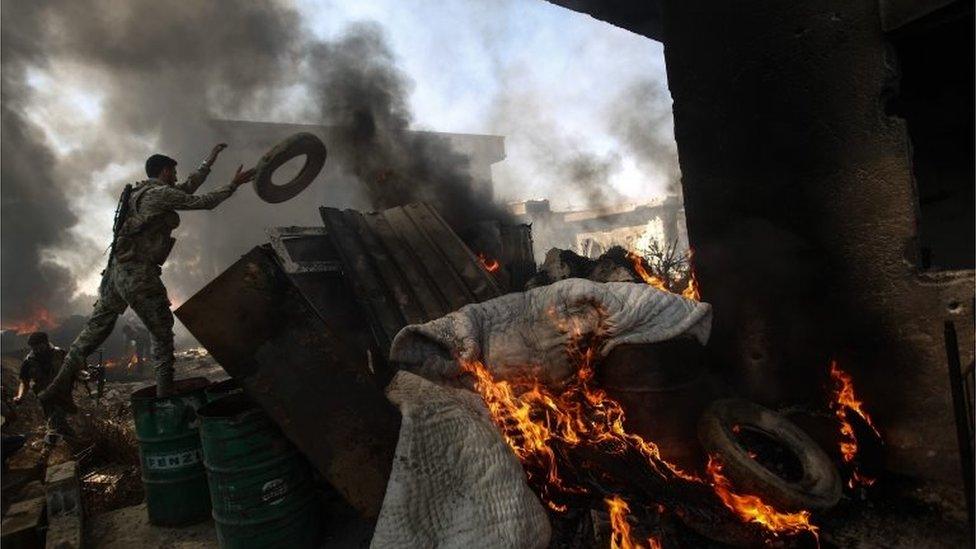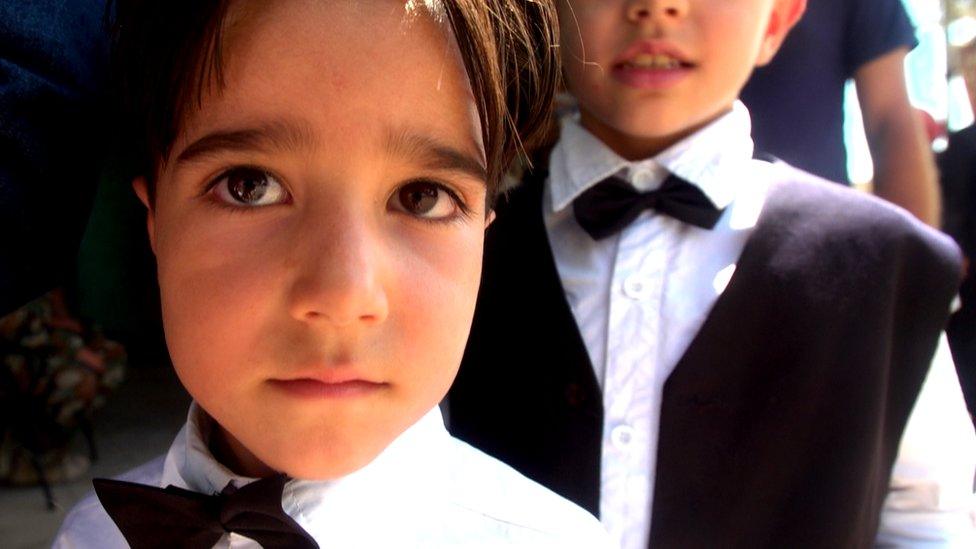Syria conflict: Grim prospect of 10 more years of war
- Published

The war has so many sides involved that an end to the fighting is still a long way off
Someone visiting central Damascus for the first time might wonder where to find the war. The covered markets in the Old City are packed with busy people. Traffic jams snarl up the streets. People with money can eat in restaurants.
The centre of the capital is the showcase of the government of President Bashar al-Assad. It has functioned well enough during the day since the war started in 2011.
Nights are a different matter. The nightlife of Damascus lives on only in a few determined outposts.
But until this last spring, visitors would not have to search for the war. They could hear it, even if they kept away from places where they could see it.
For years, flat thunderclaps of outgoing artillery fire have echoed around the city, as the Syrian army pounded rebel positions.
Whole districts a few miles from the intact, bustling city centre are in ruins. Much less often, some of the armed groups that controlled important suburbs in the ring around Damascus would fire in mortars.
Every day people were killed or made homeless.
'Ten more years'
The ceasefire deal that the Russians and the Americans arranged back in February collapsed quickly in the north.
But it is still more or less holding, or at least influencing matters, around Damascus.
That does not mean that the war is anywhere near over. A Syrian general at the ministry of defence told me they were well aware that the war in Lebanon a generation ago had lasted 16 years.
This one, he said, was much more complicated so there could be at least another 10 years of bloodshed.

But in Damascus, for now, the soundtrack of the war has disappeared. The government forces and the rebels still entrenched around the capital, particularly to the east, have decided not to bother each other too much, for now anyway.
The Syrian army is remarkably cohesive for a force that is in the sixth year of war. But it does not have the manpower to sustain operations on a range of fronts.
Aleppo, in the north, has been a priority, and fighting has raged there all summer.
The Syrian army's plan has been to seal off the rebel-held east side of the city in the same way that it has besieged much smaller pockets under the control of the opposition. The signs so far are that east Aleppo is too big and the opposition there too well-armed and organised for the army to succeed.
But it is an ancient tactic and it has worked elsewhere in Syria.
Cutting off reinforcements and resupply to fighters and food and medical care to everyone needs patience. Sustained artillery and air attacks add to the pressure. Sooner or later, if sieges are not lifted, resistance will collapse.
'No choice'
This week more civilians were evacuated from Darayya, one of the opposition-controlled suburbs to the south-west of Damascus.
The UN has condemned the evacuations because they are the result of what it called "unrelenting siege, during which children starved, people resorted to eating grass and the town was subjected to an onslaught of fighting".
Fighters emerged too, briefly, before they returned back to their positions in Muadhamiya, an opposition-held suburb close to Darayya, while their future is being negotiated.
Jeremy Bowen: "This war might have years left in it, but in this part of the capital's suburbs, for now, it looks to be over"
Just after they had said their goodbyes to wives, children and parents, they talked in a way that suggested extreme war weariness.
Colleagues who nodded agreement surrounded one of them, an articulate man in his mid-20s.
"We had to be fighters," he said, "because we didn't find any other job. If you want to stay inside you need to be a part of the FSA [Free Syrian Army, the group that has closest relations with the West]. Everything is very expensive. They pay us $100 a month but it is not enough.
"All this war is a lie. We had good lives before the revolution. Anyway this is not a revolution. They lied to us in the name of religion.
"I don't want to go on fighting but I need to find a job, a house. Everything I have is here in Muadhamiya."
Collective tragedy
The Syrian war is made up of millions of individual tragedies, and one collective tragedy.
Individuals range from fighters who would rather not fight to parents whose children are killed.
Half of Syria's pre-war population have lost their homes and either fled abroad as refugees or stayed as displaced and impoverished victims.
Quite a few of the children being evacuated from Muadhamiya had been dressed up in their best clothes for a journey into an unknown new life.

Children, in their finest outfits, were evacuated under a deal from the besieged town of Muadhamiya
It showed mothers are still proud of their children, and want them looking their best, even when life, as one said, is like death.
Two sisters matched their best toy jewellery with immaculately tied pink bows, sunhats and white summer outfits. Brothers had gelled hair and wore white shirts with black bow-ties.
But life in Syria is no kind of party.
The collective tragedy is that so many foreign countries have intervened in the war that it has become much harder to stop.
Syria's war is a big part of the historic change sweeping through the Middle East, and it is tied into other conflicts. Power is shifting, with global repercussions. More tragedies lie ahead.
The leaders of the big powers who are now entangled in Syria need first and foremost to stop making matters worse. Then a serious discussion about peace might be possible.